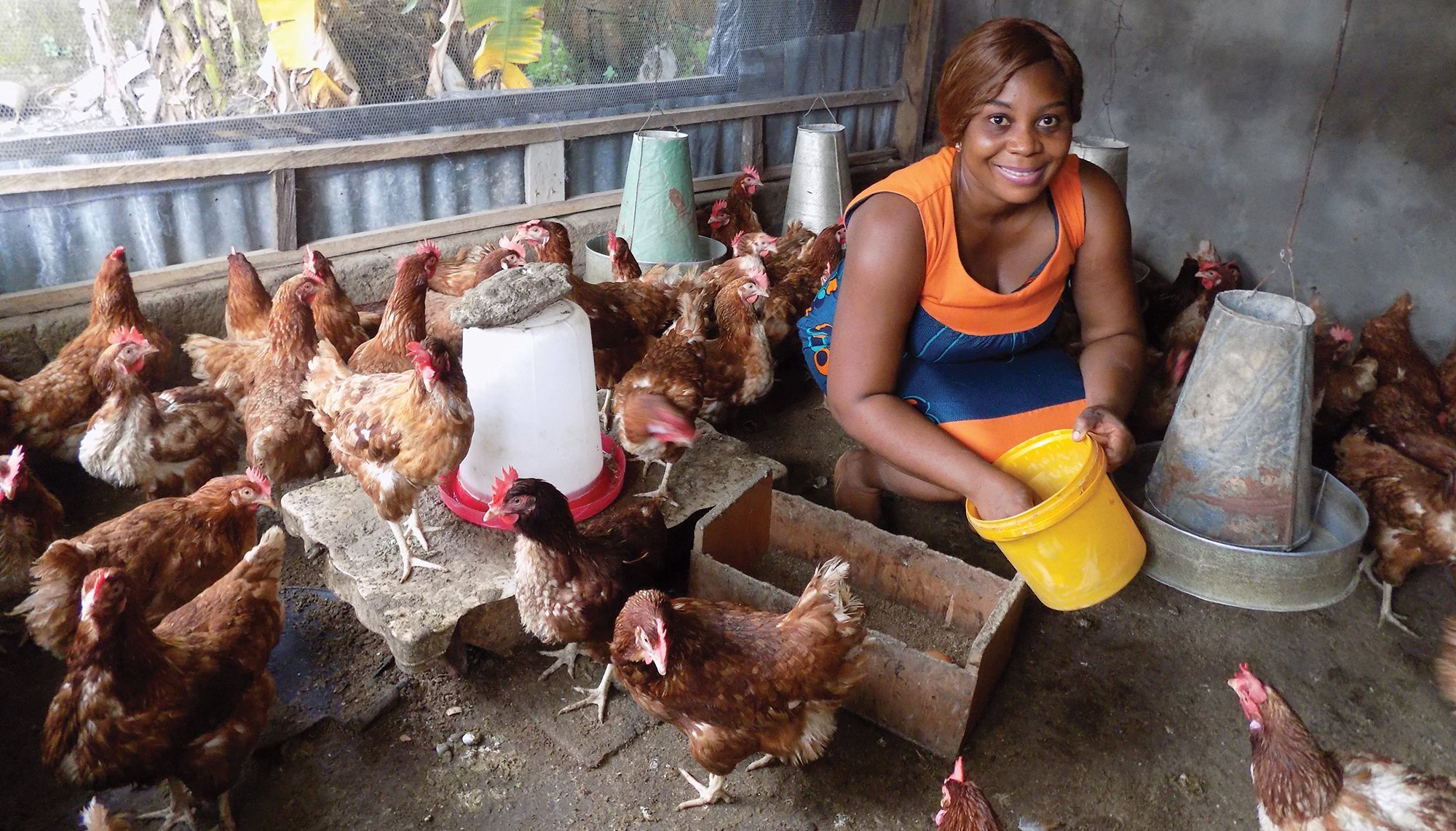Leading the way
Story

Even with 220 egg-laying hens, Chinenye Okon is unable to keep up with orders from Calabar’s restaurants, hotels and market vendors, let alone those from her friends and neighbours.
“I can’t meet the demand for eggs,” says the 37-year-old entrepreneur.
Chinenye enrolled in Cuso International’s Youth Leadership, Entrepreneurship, Access and Development (YouLead) program in August 2016. She received hands-on training at a local farm for two months, where she learned to raise and sell birds for meat.
“We actually had nests there,” says the married mother of three. “We started from eight-day-old chicks. They matured for eight weeks and then we sold them off.” She launched her farm less than a year later. “It keeps me busy and it gives me the fulfillment of meeting the needs of other people,” says Chinenye.
“It also empowers me that I am financially independent.” YouLead provides employment training in such specialties as ecotourism, forestry, aquaculture and agriculture, promoting work in Nigeria’s natural resource sectors. The empowerment of women is an essential element of the program.
Women and men have equal access to education, training and mentorship opportunities. This often leads to financial independence, and self employment is one route through which women can gain autonomy.
“You can take care of yourself. And gain respect amongst your brothers, your sisters, your in-laws,” says Chinenye. “When you have your own business, you can manage your time and make your own decisions.”
She intends to grow her flock and raise upwards of 500 meat birds a month, while boosting her egg-laying stock to 1,000 birds by the end of this year. She is looking to acquire cages to protect the eggs, crates to store them in and materials to package dressed meat birds for her “I have big plans,” says Chinenye, who is now looking to move to a larger property.
“I can make it and succeed in this business. I am determined to succeed.” Cuso alumna Millicent Letoya, who volunteered as an organizational development advisor in Calabar for six months in 2017-18, specializes in equipping non-profits with the tools needed to succeed. Interweaving gender equity, she creates a solid foundation through the development of policies and strategic plans.
“I just want women to be able to contribute to their communities in every position and at every level,” says Millicent, who is originally from Kenya and lives in Toronto. “It doesn’t matter whether they are doing youth development or they’re doing environmental work. Policies on gender are important to have in place.”
Mfon Essien, a local partner with the YouLead project, says it’s common for women to outnumber the men in his training classes, given their interest in agriculture. The Calabar-area farmer has, since 2016, trained approximately 250 entrepreneurs in poultry and fish farming. He also has a greenhouse operation and offers microfinancing.
“There are many people from university who have never seen a greenhouse,” says Mfon. “They’ve never seen a chick raised from a day old to maturity.” Practical lessons delve into livestock care, managing risk, food safety, product preparation and marketing, as well as broader topics on agriculture, economics, government and the environment.
Many trainees launch their farms soon after. “We encourage them, visit them and make sure they are on track,” says Mfon. “There’s a lot of knowledge, a lot of exposure, a lot of people now seeing the opportunities available. This is a wonderful program.” And with more people pursuing entrepreneurial opportunities in agriculture and aquaculture, local and regional economies are receiving a boost.
According to Nigeria’s National Bureau of Statistics, an astounding 55.4 per cent of youth were unemployed or underemployed at the end of 2018.
Through YouLead, Cuso International is working to reduce the “staggering” youth unemployment and poverty rates, says Jon Ntewak, who has completed two Cuso volunteer placements in Cross River State and is preparing for a third in Tanzania. During his second placement in 2017, farm visits were part of his routine. He learned farmers often struggle to obtain loans and market their products.
On one such trip, a fish farmer explained how he was having a difficult time securing regular clients. Jon helped connect him with a local hotel manager, who bought his fish.
“Through information, you help reduce poverty. That to me is the pillar. That to me is what keeps me going back,” says Jon, a retired City of Toronto social worker who is originally from Nigeria. “It was sobering for me at first. It felt good.” As the first entrepreneur in his family, Offiong Okon’s catfish farm is a source of pride among his relatives.
The 34-year-old took part in an aquaculture training program for three months then attended YouLead classes in Calabar where he fine-tuned his entrepreneurial skills. “That was a program that motivated me a lot,” he says.
“They taught me that I should think big and start very small.” Starting with a modest 300 catfish in 2016, Offiong now has 5,000 in stock. His farm is said to be the largest of Cuso’s participants established in Calabar to date, and his clients include local hotels. “Being a businessman, I can take care of my bills and also help my siblings. It assists me to take care of my family,” says the father of one. “It’s a business that has given me joy.”